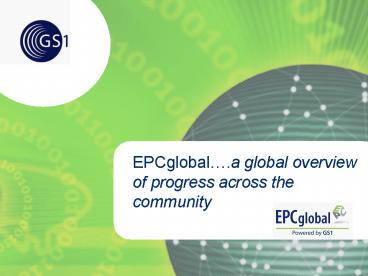EPCglobal'a global overview of progress across the community - PowerPoint PPT Presentation
1 / 25
Title:
EPCglobal'a global overview of progress across the community
Description:
Global standards for electronic business messaging. Rapid, efficient ... Academic Convocation, Cambridge (MIT) January 2006. Cambridge - UK. MIT USA ... – PowerPoint PPT presentation
Number of Views:70
Avg rating:3.0/5.0
Title: EPCglobal'a global overview of progress across the community
1
EPCglobal.a global overview of progress across
the community
2
GS1 a diversified portfolio
- GS1 has a full portfolio of products and solutions
3
EPCglobal Core Purpose
- Take a global leadership role in developing and
promoting multi-industry, user driven standards
for collaborative commerce utilising the EPC - To deliver added value to our customers and
stakeholders through our activities - Drive the global, multi-industry adoption of EPC
via the GS1 Member Organizations
4
EPCglobal Organization
Virtual organization gt 1500 people Adoption
programs Europe, Asia New action groups
Aerospace , Automotive, Apparel
Business Action
Group - TLS
Work Groups
5
EPCglobal Board of Governors
EPCglobal Board
of Governors
CPG Mftg and Retail (4)
President, EPCglobal (1)
Gillette (Board Chairman) Metro Procter
Gamble WalMart
Member Organizations (3)
Latin America Europe Far East
Trans/Logistics (1) DHL
Healthcare (2) JJ Novartis
MIT (1)
Technology (2) HP Cisco
Consumer Electronics (1) Sony
Public Sector (1) DoD
Aerospace (1) Lockheed Martin
6
EPCglobal research partners Auto ID Labs
- Cambridge - UK
- MIT USA
- Adelaide - Australia
- St. Gallen Switzerland
- Fudan China
- Keio Japan
- ICU South Korea
Widening scope to include other research
organizations globally. Academic Convocation,
Cambridge (MIT) January 2006
7
Global Membership (March 2006)
- Each member joins once in the location of the
head office
8
Membership expanding globally (March 2006)
- Each member joins once in the location of the
head office
9
35 countries and growing fast!
USA (Membership 460) End Users 309 Solution
Providers 151
10
End users now 54 of total membership
11
Why are global standards important?
- Reduce complexity
- Within organizations
- Between organizations
- For H/W and S/W production and purchase decisions
- Reduce cost
- Implementation
- H/W, S/W and Integration
- Facilitate trading partner collaboration
- Allow organizations to focus more on how to use
the information than how to get information
12
Standards in Progress, March 2006
Business/ Technical Approval
Business Requirements
Board Ratification
Development
Prototyping
Certification
Data Exchange (Supports Track Trace)
? ONS 1.0
? ALE 1.0
Internal Systems (Supports Inventory Mgmt,
Shipping, Receiving)
? Tag Data Translation 1.0
? Tag Data Standard v1.1
Object Exchange (Tags /Readers)
? Tag Data Standard v1.3
? - Gen2
? - GEN2 Tags Readers
13
Item Level Tag Update
- Now referred to Air Interface WG
- Technology Demonstrations were not conclusive
- Leadership of HLS BAG have requested that a HF WG
be created - HF WG and UHF WG have been established based on
the business scenarios created in the AIWG but
will work collaboratively - Linkage between Work Groups must be consistent
- Marketplace will decide
14
Compliance Testing Implemented
- Allows confident, low cost technology buying
decisions - Allows marketplace to thrive
- Types of testing
- Conformance (certification by Met Labs and
EPCglobal) - Interoperability (test reports)
- Performance (conducted by accredited test labs)
15
Regulatory infrastructure (UHF)
- Spectrum allocation to allow use of Gen2
- UHF spectrum (860-960 MHz) and power regulations
(2w erp/4w eirp) - Significant progress made
16
Global status regulations UHF
17
Current Business Action Groups
- FMCG
- Implementations underway
- Focus migrating to item level tagging
- Healthcare Life Sciences
- Focus on patient safety and pedigree
- Pilots will be in US
- Transportation Logistics
- BAG formed late last year
- Workgroup structure in place
- Includes Customs, Logistics, IATA
18
Membership growth in all sectorsUS example
- Momentum is developing rapidly in new sectors
Example shows split of EPCglobal US end user
membership
19
New Industries Outlook
- New industries likely to become BAGs during 2006
- Automotive
- Aerospace
- Apparel, Footwear and Fashion
- Other key industries currently at early
discussion stage - Defense
- Food and Beverage
- High Tech
- Chemical
- Structured process for on-boarding
- Increasing use of common work groups where
appropriate
20
EPCglobal Planning Tools
- Strategic Plan 2006-2008
- Finalized and distributed Q3 2005
- Annual work plan 2006
- 100 actions and deadlines
- Covers whole EPCglobal community
- Joint Steering and Planning Group established
- Lead strategic planning
- Consolidate and prioritize work plan items
- Peloton
- Linking milestones to benefit realization
- FMCG (North American and Europe versions), HLS,
TLS tbd
21
Strategic Objectives
- Develop user-driven EPC technology standards that
support multiple industries globally - Enable supply chain transformation through
standardized data exchange using the EPCglobal
Network standards and protocols - Ensure that an effective environment and
organization is in place to successfully support
EPCglobal standards and technology implementation
globally
22
Strategies 2005-2008
- 1) Standards Development
- 2) Technology
- 3) Public Policy
- 4) EPCglobal Organization and Process
- 5) Marketing/Communication
- 6) Intellectual Property
- 7) Adoption
23
Supply chain visibility
- Potential to transform business process
- The power of event related information
- Improved patient safety
- Reduced counterfeit
- Improved customer availability
- Demand driven supply chain
- Reduced inventory
- Improved ability to track and trace
- Shrinkage
- Returnable Assets
- Transformation of commercial relationships
24
In summary
- EPCglobal ..from hope to hype to implementation.
- 2005 - incredible progress made
- Global standards infrastructure is developing
quickly - The EPCglobal community grows stronger every day
- Life is becoming more complex. but this is a
good sign! - Physics and standards challenges are being
overcome - Prices are going down
- The benefits of visibility are starting to be
realized - The community has started to move decisively from
preparation to implementation
25
EPCglobal - where technology meets business needs































